Related Research Articles
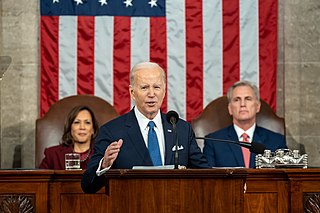
The State of the Union Address is an annual message delivered by the president of the United States to a joint session of the United States Congress near the beginning of most calendar years on the current condition of the nation. The State of the Union Address generally includes reports on the nation's budget, economy, news, agenda, progress, achievements and the president's priorities and legislative proposals. The State of the Union Address, a pivotal annual event, serves as a comprehensive reflection on the nation's current state, encompassing the president's strategic vision, economic outlook, and key legislative proposals before the United States Congress.

John Andrew Boehner is a retired American politician who served as the 53rd speaker of the United States House of Representatives from 2011 to 2015. A member of the Republican Party, he served 13 terms as the U.S. representative for Ohio's 8th congressional district from 1991 to 2015. The district included several rural and suburban areas near Cincinnati and Dayton.

Cathy Anne McMorris Rodgers is an American politician who is the United States representative for Washington's 5th congressional district, which encompasses the eastern third of the state and includes Spokane, the state's second-largest city. A Republican, McMorris Rodgers previously served in the Washington House of Representatives. From 2013 to 2019, she chaired the House Republican Conference.
In the United States, a designated survivor is a person in the presidential line of succession who is kept distant from others in the line when they are gathered together, to reduce the chance that everyone in the line will be unable to take over the presidency in a catastrophic or mass-casualty event. The person is chosen to stay at an undisclosed secure location, away from such events such as State of the Union addresses and presidential inaugurations. The designation of a survivor is intended to prevent the decapitation of the government and to safeguard continuity in the presidency if the president, the vice president, and others in the presidential line of succession die. The procedure began in the 1950s, during the Cold War, with the idea that nuclear attack could kill government officials and the United States government would collapse.
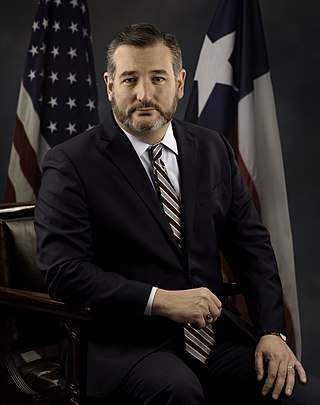
Rafael Edward Cruz is an American politician, attorney, and political commentator serving as the junior United States senator from Texas since 2013. A member of the Republican Party, Cruz was the solicitor general of Texas from 2003 to 2008.

The 114th United States Congress was a meeting of the legislative branch of the United States of America federal government, composed of the United States Senate and the United States House of Representatives. It met in Washington, D.C., from January 3, 2015, to January 3, 2017, during the final two years of Barack Obama's presidency. The seats in the House were apportioned based on the 2010 United States census.

The 2010 State of the Union Address was given by the 44th president of the United States, Barack Obama, on January 27, 2010, at 9:00 p.m. EST, in the chamber of the United States House of Representatives to the 111th United States Congress. It was Obama's first State of the Union Address and his second speech to a joint session of the United States Congress. Presiding over this joint session was the House speaker, Nancy Pelosi, accompanied by Joe Biden, the vice president, in his capacity as the president of the Senate.
In American politics, the response to the State of the Union address is a rebuttal speech, often brief, delivered by a representative of an opposition party following a presidential State of the Union address. When the president is a Democrat, the rebuttal is typically given by a Republican, and vice versa.

The 2011 State of the Union Address was given by the 44th president of the United States, Barack Obama, on January 25, 2011, at 9:00 p.m. EST, in the chamber of the United States House of Representatives to the 112th United States Congress. It was Obama's second State of the Union Address and his third speech to a joint session of the United States Congress. Presiding over this joint session was the House speaker, John Boehner, accompanied by Joe Biden, the vice president, in his capacity as the president of the Senate.

The American Jobs Act and was the informal name for a pair of bills recommended by U.S. President Barack Obama in a nationally televised address to a joint session of Congress on September 8, 2011. He characterized the proposal as a collection of non-controversial measures designed to get Americans back to work, and he repeatedly urged Congress to pass it "right away"; he also said that the bills would not add to the national deficit and would be fully paid for.
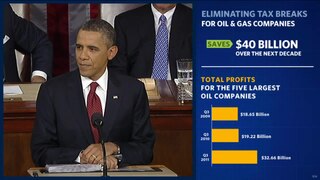
The 2012 State of the Union Address was given by the 44th president of the United States, Barack Obama, on January 24, 2012, at 9:00 p.m. EST, in the chamber of the United States House of Representatives to the 112th United States Congress. It was Obama's third State of the Union Address and his fourth speech to a joint session of the United States Congress. Presiding over this joint session was the House speaker, John Boehner, accompanied by Joe Biden, the vice president, in his capacity as the president of the Senate.
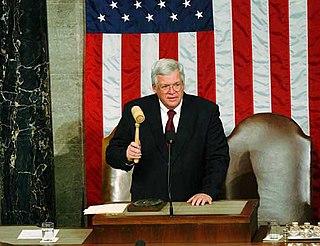
The Hastert rule, also known as the "majority of the majority" rule, is an informal governing principle used in the United States by Republican Speakers of the House of Representatives since the mid-1990s to maintain their speakerships and limit the power of the minority party to bring bills up for a vote on the floor of the House. Under the doctrine, the speaker will not allow a floor vote on a bill unless a majority of the majority party supports the bill.
The following is a timeline of the presidency of Barack Obama, from January 1, 2013 to December 31, 2013. For his time as president-elect, see the presidential transition of Barack Obama; for a detailed account of his first months in office, see first 100 days of Barack Obama's presidency; for a complete itinerary of his travels, see list of presidential trips made by Barack Obama.

The 2013 State of the Union Address was given by the 44th president of the United States, Barack Obama, on February 12, 2013, at 9:00 p.m. EST, in the chamber of the United States House of Representatives to the 113th United States Congress. It was Obama's fourth State of the Union Address and his fifth speech to a joint session of the United States Congress. Presiding over this joint session was the House speaker, John Boehner, accompanied by Joe Biden, the vice president, in his capacity as the president of the Senate.

During Barack Obama's tenure as President of the United States from 2009 to 2017, certain Republican members of Congress, as well as Democratic congressman Dennis Kucinich, stated that Obama had engaged in impeachable activity and that he might face attempts to remove him from office. Rationales offered for possible impeachment ranged from Obama allowing people to use bathrooms based on their gender identity, to the 2012 Benghazi attack, to Obama's enforcement of immigration laws, and false claims that he was born outside the United States.

The 2014 State of the Union Address was given by the 44th president of the United States, Barack Obama, on January 28, 2014, at 9:00 p.m. EST, in the chamber of the United States House of Representatives to the 113th United States Congress. It was Obama's fifth State of the Union Address and his sixth speech to a joint session of the United States Congress. Presiding over this joint session was the House speaker, John Boehner, accompanied by Joe Biden, the vice president, in his capacity as the president of the Senate.
United States House of Representatives v. Azar, et al. was a lawsuit in which the United States House of Representatives sued departments and officials within the executive branch, asserting that President Barack Obama acted illegally in his implementation of the Patient Protection and Affordable Care Act. The lawsuit was touted by House Speaker John Boehner, and asserted that President Obama exceeded his constitutional authority in delaying the implementation of the employer mandate of the Affordable Care Act and also addressed "Republican opposition to an estimated $175 billion in payments to insurance companies over the next 10 years as part of a cost-sharing program under the healthcare law."
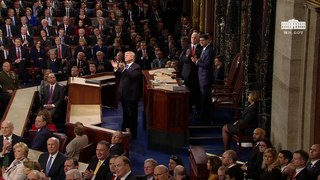
The 2018 State of the Union Address was given by the 45th president of the United States, Donald Trump, on January 30, 2018, at 9:00 p.m. EST, in the chamber of the United States House of Representatives to the 115th United States Congress. It was Trump's first State of the Union Address and his second speech to a joint session of the United States Congress. Presiding over this joint session was the House speaker, Paul Ryan, accompanied by Mike Pence, the vice president, in his capacity as the president of the Senate.

The 2020 State of the Union Address was given by the 45th president of the United States, Donald Trump, on February 4, 2020, at 9:00 p.m. EST, in the chamber of the United States House of Representatives to the 116th United States Congress. It was Trump's fourth and final State of the Union Address and his fourth and final speech to a joint session of the United States Congress. Presiding over this joint session was the House speaker, Nancy Pelosi, accompanied by Mike Pence, the vice president, in his capacity as the president of the Senate.

2010s in United States political history is the compiled history of major political events and issues in the United States from January 1, 2010, through December 31, 2019. During this time period the United States experienced a wave of unprecedented political polarization and ongoing political debates such as climate change, voting rights, gun control, police misconduct, and immigration. The ongoing 2008 financial crisis dominated the early Obama presidency (2009-2017). Democrats held the majority in both houses of Congress and control of the presidency which enabled Obama to pass numerous landmark legislative pieces such as the Lily Ledbetter Fair Pay Act, Dodd-Frank, the Affordable Care Act (Obamacare), and the Don't Ask Don't Tell Repeal Act of 2011. Economic inequality and lack of accountability stemming from the financial crisis led to the 2011 Occupy Wall Street movement which quickly expanded into hundreds of American cities. The enactment of the Affordable Care Act generated both national support and backlash around the administration's effort to expand the federal government's role in healthcare. The United States Supreme Court ruled in Citizens United v. FEC that laws restricting campaign finance donations were unconstitutional leading to a nationwide argument and scholastic research on campaign finance reform and the impact corporations have in American democracy. Conservative opposition such as the Tea Party Movement coalesced and won the 2010 midterm elections in a landslide. Obama's approval ratings fluctuated prior to the 2012 presidential election due to factors such as the economy and opposition to Obamacare. The Obama administration recovered and won widespread public praise following the assassination of Osama bin Laden, the mastermind behind the 9/11 attacks, and a strong, co-ordinated response to Hurricane Sandy. Congress stalled on the administration's immigration reform agenda, prompting Obama to sign an executive order establishing the DACA program. Prior to the election, the administration was scrutinized for its response to the 2012 Benghazi terrorist attacks in which sitting US ambassador J. Christopher Stevens was assassinated.
References
- ↑ Jackson, David (December 19, 2014). "Obama to deliver State of the Union on Jan. 20". USA Today. Retrieved December 22, 2014.
- ↑ Boehner, John A. (December 19, 2014). "Letter to the President" (PDF). Congress of the United States, House of Representatives. Archived from the original (PDF) on December 22, 2014. Retrieved December 22, 2014.
- ↑ Carrie, Dann (December 19, 2014). "Boehner Invites Obama for State of the Union Address on January 20". NBC News. Retrieved December 22, 2014.
- ↑ John, Arit (November 28, 2014). "Conservatives: Don't Let Obama Give State of the Union Address". Bloomberg News. Retrieved December 22, 2014.
- ↑ "2015 State of the Union". whitehouse.gov . Retrieved January 21, 2015– via National Archives.
- ↑ "State of the Union 2015 - gop.gov". gop.gov. Retrieved January 21, 2015.
- 1 2 3 "State of the Union: Obama's Economic Proposals Add to Growing 2016 Debate". NBC News . Retrieved January 31, 2015.
- 1 2 3 4 Demirjian, Karoun (January 21, 2015). "Russia's response to SOTU: 'U.S. intends to dominate the world'". The Washington Post . Retrieved January 21, 2015.
- ↑ Jennifer Epstein (January 19, 2015). "Michelle Obama State of the Union guest list: Who's sitting with the First Lady - POLITICO". POLITICO. Retrieved January 21, 2015.
- ↑ "BBC News - US Justice Ginsburg admits she was not sober during speech". BBC News. February 14, 2015. Retrieved February 15, 2015.
- ↑ "Obama's 'designated survivor:' Anthony Foxx". USA Today. January 20, 2015.
- ↑ Jackson, David (January 20, 2015). "O". NationalJournal. Archived from the original on January 21, 2015. Retrieved January 20, 2015.
- ↑ "Obama says 'shadow of crisis has passed'". AAP. Retrieved January 21, 2015.
- ↑ Gregory Korte, USA TODAY (January 21, 2015). "More than a speech, it's now State of the Union season". USA Today. Retrieved January 21, 2015.
- ↑ Sullivan, Sean (January 21, 2015). "Obama draws new round of GOP animosity with 'I won both of them' line". The Washington Post .
- ↑ Chittal, Nisha (January 21, 2015). "The State of the Union's buzziest moment: 'I won both of them'". MSNBC.
- ↑ "Lawmakers Hold Pencils at SOTU in Support of Free Speech". NBC News . January 20, 2015.
- ↑ Tessa Berenson (January 20, 2015). "State of the Union 2015". TIME.com. Retrieved January 21, 2015.
- ↑ Schreckinger, Ben; Kim, Seung Min (January 21, 2015). "GOP talks immigration reform in Spanish, but not English". politico.com . Retrieved February 26, 2015.
- ↑ Berenson, Tessa (January 20, 2015). "There will be 5 Republican Responses to the SOTU". Time . Retrieved February 26, 2015.
- ↑ "The state-of-the-union address: "Middle-class economics"". The Economist. January 24, 2015. Retrieved January 31, 2015.

